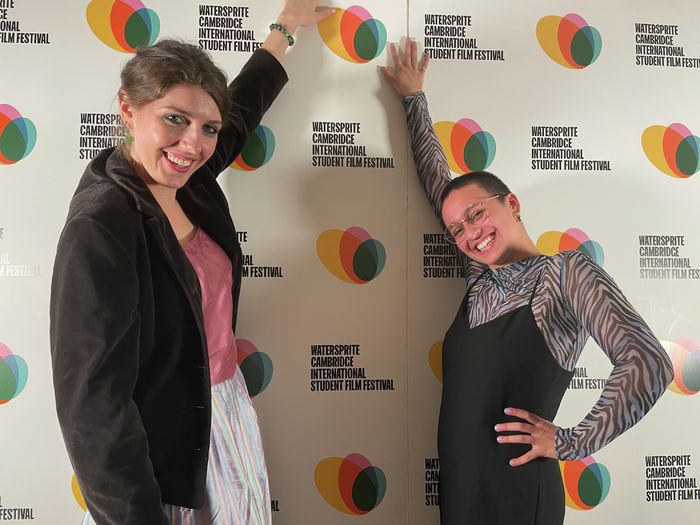Cambridge Shorts Showcase was an unpolished yet unqualified success
Imogen Barnes reflects on an exciting evening that gave a well-deserved boost to the too often unsung work of amateur student filmmakers

As people stumbled their way through the labyrinthian courts of St John’s and slowly began trickling into the College’s Palmerston room, they were rewarded with friendly faces and popcorn. It was there, in the room better known as John’s Picturehouse, that the Cambridge University Film Association (CUFA) held their biannual showcase of student short films, Cambridge Shorts.
CUFA’s latest showcase featured a selection of carefully curated student shorts, interspersed with Q&As with some of the student filmmakers. Those in attendance seemed to reflect Cambridge’s film scene; small in number but mighty in devotion.
“‘Spontaneous’ and ‘experimental’ were the buzzwords of the night”
What emerged on the screen was a patchwork tapestry of perspectives on the world, all united by a sense of spontaneity and freshness, from an amateur’s comedic ode on riding bikes, to a film student’s touching portrait of her portraitist grandfather.
It was in CUFA’s intervening interviews that this sense of informality and creative abandon became the most apparent. “This is the first and last film I’ll probably ever make”, remarked Sahota, an amateur filmmaker and future doctor. Another contributor, Sameera Bhalotra Bowers, in her first year at Cambridge, remarked how ‘in the moment’ her filmmaking process was, imploring aspiring filmmakers to just pick up a camera and start recording. All in all, ‘spontaneous’ and ‘experimental’ were the buzzwords of the night.
The event, much like the films it showcased, was rough around the edges and without polish or pretence. Comic interludes of technical difficulties, from malfunctioning lights to misfiring sound equipment, soon diffused the anticipation in the room and served as a reminder that this evening and this society were both designed for beginners looking at the intimidating world of cinema. It was a group of people getting together and giving it a go; getting it wrong sometimes, sure, but creating real moments of intimacy, humour and creativity along the way.
And so, it was revealed that behind almost every filmmaker’s submission was a story of mistakes. During the Q&As, what went wrong was discussed as much as what went right. A film student’s scrapped voice-over on account of her dislike for her own voice, a disregarded ‘day in the life’ format that felt too impersonal to portray a well-loved family member; the list went on and on.
“Getting together and giving it a go; getting it wrong sometimes, sure, but creating real moments of intimacy, humour and creativity along the way.”
It did feel like a lifting of the lid off student cinema, demystifying a scene that deserves to be much more lively than it actually is. There is something about student film that feels paradoxically inaccessible, something that gives it this air of mystery; how do you get involved? What equipment do you use? Where do you even start? Well, in addition to their laudable efforts to encourage newcomers, CUFA’s short film showcase was itself an answer to these questions.
Bhalotra Bowers made her submission, Michaelmas, after a disappointing first term of university that left her feeling lonely and dispirited. It is a first person, vlogger-esque dive into this fragile state of mind, inspired — in an almost ‘lightning in a bottle’ manner — by personal experience. She had little technical equipment and edited it using iMovie, an app that, as she herself pointed out, is freely available to use for anyone with an Apple device.
Moreover, questioned on her impressive use of sound, Cecile Arira spoke of trawling through reams of royalty-free audio clips online. Her efforts required time, certainly, but no specialist expertise, equipment or know-how.
The verdict is clear: the Cambridge film scene is, despite certain misconceptions, open and ready for all. So why not get a lifetime CUFA membership for a mere £20, start attending events like these and set those cameras rolling! The film scene is a blank canvas just waiting for you to make your mark — so what will you add?
 News / Caius mourns its tree-mendous loss23 December 2025
News / Caius mourns its tree-mendous loss23 December 2025 News / Clare Hall spent over £500k opposing busway 24 December 2025
News / Clare Hall spent over £500k opposing busway 24 December 2025 Comment / The ‘class’ of Cambridge24 December 2025
Comment / The ‘class’ of Cambridge24 December 2025 Interviews / Politics, your own way: Tilly Middlehurst on speaking out21 December 2025
Interviews / Politics, your own way: Tilly Middlehurst on speaking out21 December 2025 Comment / Yes, I’m brown – but I have more important things to say22 December 2025
Comment / Yes, I’m brown – but I have more important things to say22 December 2025








